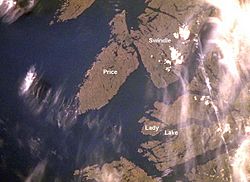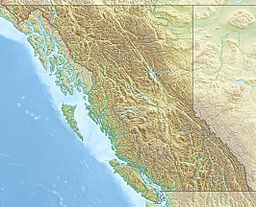Milbanke Sound facts for kids
Quick facts for kids Milbanke Sound |
|
|---|---|

Satellite image of Milbanke Sound
|
|
| Location | British Columbia, Canada |
| Coordinates | 52°19′N 128°33′W / 52.317°N 128.550°W |
| Type | Sound |
| Ocean/sea sources | Pacific Ocean |
Milbanke Sound is a large inlet of the sea, also known as a sound. It is located on the coast of British Columbia, a province in Canada. This area is part of the beautiful Pacific Ocean.
Contents
Exploring Milbanke Sound's Geography
Milbanke Sound stretches eastward from Queen Charlotte Sound. It is surrounded by several islands. Price Island is to its west, and Swindle Island is to its north. The Bardswell Group of islands lies to the south.
This sound is an important part of the Inside Passage. The Inside Passage is a famous water route used by ships and boats. From the east, Seaforth Channel connects to Milbanke Sound. Finlayson Channel joins from the north. Another channel, Mathieson Channel, also connects from the north. It leads to a protected area called Fiordland Conservancy.
Volcanoes Near the Sound
Around the islands near Milbanke Sound, there is a group of five volcanoes. These volcanoes are known as the Milbanke Sound cones.
A Look at Milbanke Sound's History
The land around Milbanke Sound has a rich history. The Heiltsuk people have lived here for a very long time. They are the traditional owners of this land.
Early Explorers and Traders
In 1788, a British fur trader named Charles Duncan sailed into Milbanke Sound. He was the captain of a ship called the Princess Royal. At that time, this area was not yet mapped. Captain Duncan spent a few days trading with the Heiltsuk people. He named the sound after Vice Admiral Mark Milbanke. A few years later, the famous explorer George Vancouver also sailed through the sound.
In 1805, a trading ship from Boston, the Atahualpa, faced trouble here. A group of Tlingit people attacked the ship. The captain and some of his crew members were killed.
The Hudson's Bay Company
In 1833, the Hudson's Bay Company set up a trading post in the Milbanke Sound area. It was called Fort McLoughlin. William Fraser Tolmie worked there from 1833 to 1834. He wrote about the fur trade in the area. He said that people traded furs with the Coast Tsimshians and Heiltsuks. They used a special language for trading. It was a mix of Haida dialects and English. At that time, Chinook Jargon, which was common elsewhere, was not widely used in Milbanke Sound. Fort McLoughlin operated for about ten years. After that, it was closed. Later, the company opened a small store in the same spot.
Improving Safety for Ships
To make travel and shipping safer, a lighthouse was built in 1898. It was placed at Robb Point on Ivory Island. Lighthouses help guide ships and prevent accidents.
Recent Discoveries
In recent times, scientists have been studying the Milbanke Sound area. They have carried out archaeological investigations. This means they look for old objects and sites to learn about the past.
Milbanke Sound's Economy
Today, Milbanke Sound is a popular spot for people who love to fish. Many sports fishing fans visit the sound.


